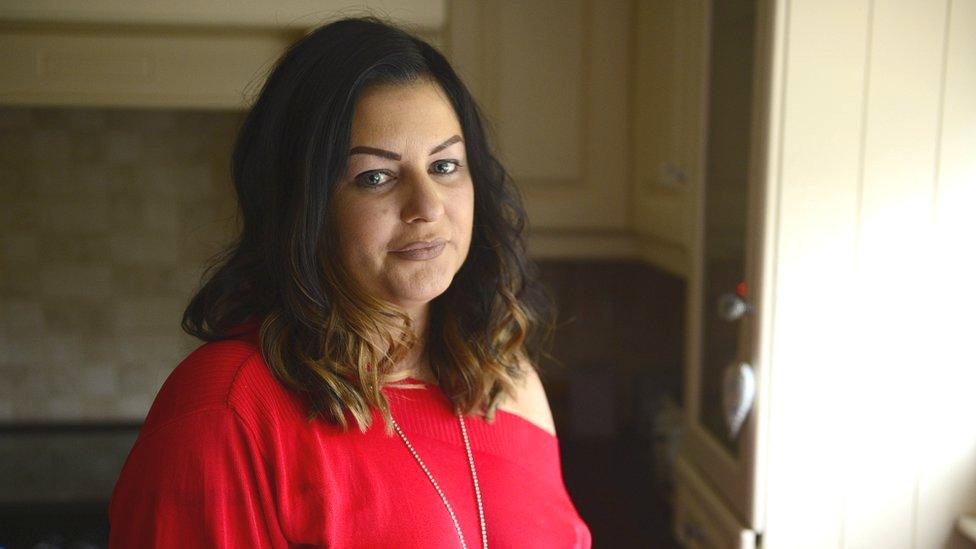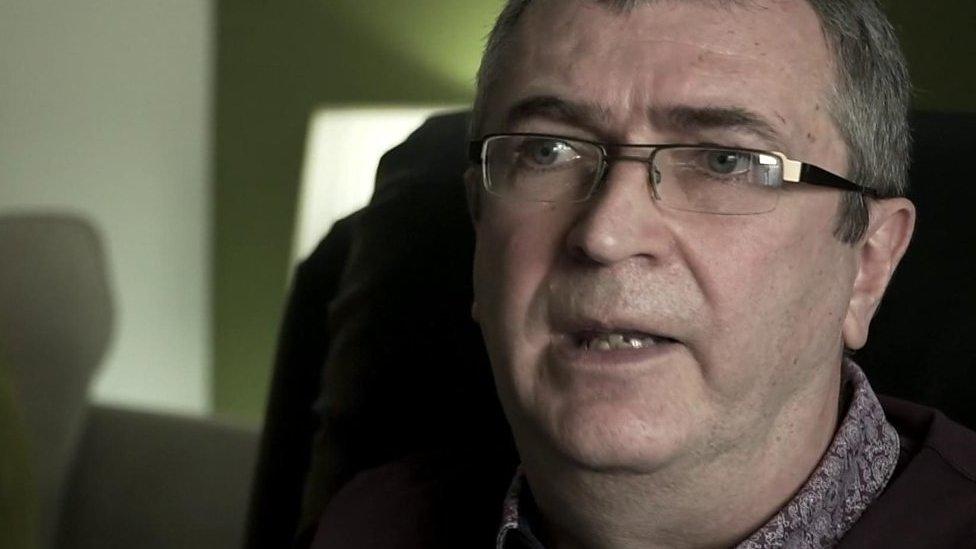Motor neurone disease: Six-month death rule 'discriminatory'
- Published

Lorraine Cox was diagnosed with motor neurone disease when she was 37
A woman who has motor neurone disease was unjustifiably denied fast-tracked disability benefits because it was not clear how long she would survive, the High Court has ruled.
In a landmark verdict, the judge ruled Lorraine Cox, 40, suffered a breach of her human rights.
While other people with life-limiting conditions had the immediate right to enhanced payments, she was refused.
This was "manifestly without reasonable justification", said the judge.
In court on Wednesday, Mr Justice McAlinden ruled the difference in treatment for terminally-ill claimants who cannot reasonably meet the six-month life expectancy rule was discriminatory.
He granted her leave for a judicial review.
Welcoming the news, Law Centre NI legal officer Owen McCloskey who supported Ms Cox in taking her case, said this was "a hugely important decision that will have implications for terminally ill claimants across the UK".
'Death within six months'
Ms Cox, a mother-of-three from Derrylin, County Fermanagh, had challenged the legal definition of a terminal illness.
In 2018, at the age of 37, she was diagnosed with motor neurone disease (MND), a progressive neurological illness for which there is no cure.
She was told she had a life expectancy of between two to five years.
Allow X content?
This article contains content provided by X. We ask for your permission before anything is loaded, as they may be using cookies and other technologies. You may want to read X’s cookie policy, external and privacy policy, external before accepting. To view this content choose ‘accept and continue’.

She retired on medical grounds and applied for Personal Independent Payments (PIP).
Under special rules, people with a terminal illness are entitled to an enhanced rate without having to undergo assessment.
But they must demonstrate that death is reasonably expected within six months.
It took more than a year of tribunals, appeals and face-to-face assessments before Ms Cox qualified for increased payments.
'All the hoops'
Her lawyer said she had to spend months searching for work in a separate attempt to secure Universal Credit (UC).
Legal proceedings were brought against Stormont's Department for Communities and the secretary of state for work and pensions.
Counsel for Ms Cox argued the current rules breached her right to freedom from discrimination under Article 14 of the European Convention on Human Rights.
Allow X content?
This article contains content provided by X. We ask for your permission before anything is loaded, as they may be using cookies and other technologies. You may want to read X’s cookie policy, external and privacy policy, external before accepting. To view this content choose ‘accept and continue’.

Although her illness is fatal, a definitive prognosis is impossible due to its "unpredictable trajectory", the court was told.
However, people who suffer from other terminal conditions who have greater certainty about when they will die have their benefit claims fast-tracked without having to "go through all the hoops".
At the hearing, statistics were presented that showed 14% of those granted immediate access to payments because they were expected to die within six months, were still alive three years later.
Lawyers for the government argued the rules ensured those closest to death received benefits without delay.
They argued that public funds were safeguarded by avoiding an open-ended definition of terminal illness that could apply to many more people than currently qualify.
'Spending time with family'
In his ruling, Mr Justice McAlinden said: "It is hard to imagine a more devastating diagnosis for a single mother of three young children.
"This illness is a progressive neurological condition for which there is no effective treatment or cure.
"The progression of the illness is unpredictable but it would seem that 50% of those individuals diagnosed with the condition die within three years of diagnosis."

The judge said it was hard to imagine a more devastating diagnosis for a single mother of three young children
The judge said he could find nothing to justify or explain why those individuals who have a terminal diagnosis but are not expected to die within six months and those individuals with a terminal diagnosis and who are reasonably expected to die within six months but who survive beyond that six month period are treated differently.
"This difference in treatment is manifestly without reasonable justification and is, therefore, in breach of Article 14 of the European Convention on Human Rights," the judge said.
"To the extent indicated above, the applicant succeeds in her application for judicial review."
Speaking after the ruling, Ms Cox said what she and others like her had to go through was unfair.
"At a time when I should have been focusing on spending the remainder of my life with my family and friends, I have instead had to go through this ordeal.
"I feel my decision has been justified and I hope not a single person has to go through the same experience again.
"I hope the six-month rule can now be scrapped as quickly as possible to ensure that is the case."
Mr McCloskey, from the Law Centre, said: "The pressure to scrap the six month rule has been growing for a long time now, with campaigners highlighting the additional pain and stress many claimants are forced to endure because of it.
"This judgement makes clear that the current different treatment of different groups of terminally ill claimants is discriminatory and in breach of our client's human rights."
- Published18 June 2020

- Published15 January 2020
